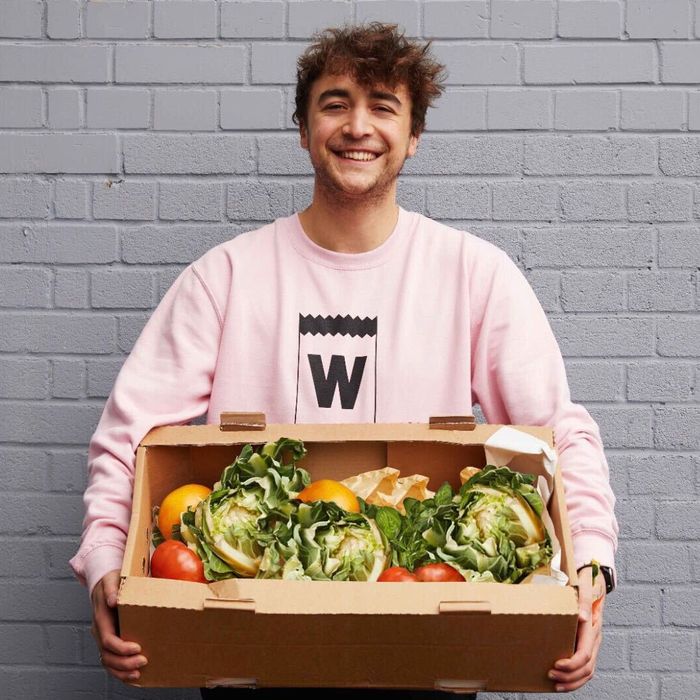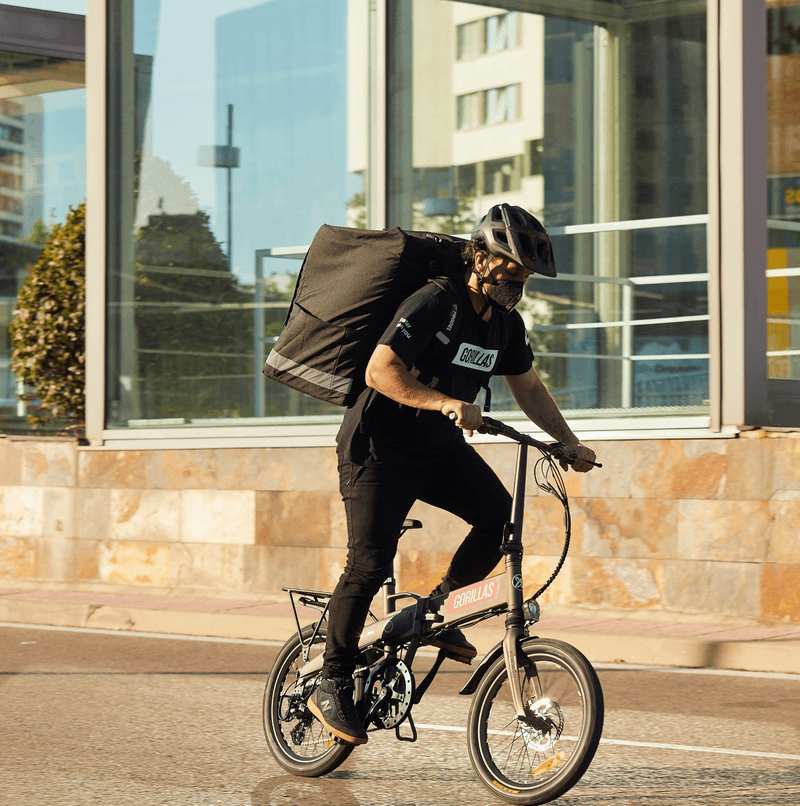The Rapid Rise of On-Demand Grocery Delivery Startups
Category: Uncategorized
It’s hard to walk down the street these days without spotting an ad for a 10-minute grocery delivery app, usually boasting snappy names, Gen Z-friendly branding, and refer-a-friend promotions. Capitalising on the huge increase in demand for online grocery deliveries during COVID-19, these companies are offering high-quality groceries, straight to people’s doors, in less time than it takes you to pop to the local corner shop.
With growing fleets of couriers and dark stores popping up across the country, and VCs and social media influencers alike all jumping on board the on-demand grocery hype, the sector is certainly booming. But which startups are steering this trend? And how are their competitors responding? Building on our recent FoodTech Report, produced in collaboration with Huckletree, we take a closer look at the high-growth UK companies transforming the grocery delivery space in 2021.
The ascent of on-demand grocery delivery
Between 2011 and 2020, high-growth UK foodtech companies raised a massive £2.6b in equity investment, across 1,202 funding rounds. Of these ambitious businesses, 13 are currently operating in the on-demand grocery shopping sector. Just under half (6) are based in London, whilst two are headquartered in Scotland, and the remaining five scattered across England. The number of on-demand grocery companies in the UK has grown rapidly since 2014. And whilst this growth had started to steady off in recent years, we saw a resurgence in 2020, amidst the coronavirus pandemic.
In February 2021, a year after the start of the pandemic, online grocery sales made up 15.4% of the UK grocery market, compared to just 8.7% in February last year. Whilst this figure has since fallen, with the removal of many COVID-19 restrictions, it remains high, at 13.0%. But with the surge in online grocery orders came a shortage of home delivery slots, long lead times, (often odd) substitutions, and pricey minimum basket fees. Many incumbent delivery firms and retailers seemed ill-prepared for the grocery revolution. Every penny counts but, in 2021, so does every second.
Whether or not you think on-demand grocery delivery startups will outlast the pandemic, for the time being, this nascent industry is certainly moving full steam ahead. In fact, on-demand grocery delivery companies in the UK have already raised more than £68m in equity funding this year, from several big name venture capital funds, and the likes of crowdfunding platform Seedrs, Glasgow-based angel network Kelvin Capital, and Scottish Enterprise’s Scottish Co-Investment Fund.
Which UK startups are delivering on expectations?
Many of the UK’s leading e-commerce startups are currently battling it out in the Capital’s on-demand grocery delivery market, most notably London-based Weezy and Zapp. Founded in November 2020, newcomer Zapp has already raised more equity investment than any other on-demand grocery company in the UK (totalling £31.6m) and promises 24/7 delivery, in 20 minutes or less. It’s now operating in Central London, Manchester, Paris, and Amsterdam.
Meanwhile, started by co-founders Kristof Van Beveren and Alec Dent in 2019, Weezy offers customers more than 2,000 products to choose from, and aims to deliver within 15 minutes. In January 2021, Weezy secured a £14.7m fundraising (from DN Capital, Heartcore, and Left Lane Capital, among other angel investors) to hire 50 more employees and open 40 new fulfilment centres across the UK.

Zapp and Weezy aren’t the only London startups applying the dark store model to grocery delivery services, however, with Islington-based Jiffy also launching during the pandemic. And the company has since gone on to secure £2.6m in equity funding. Also operating in London are Devo and Grocemania, both founded in 2016, alongside e-cargobikes.com, which is using zero emission electric bikes to deliver groceries from supermarkets, such as Sainsbury’s and Co-op.
Outside of London, there are several other high-growth businesses operating in the on-demand food delivery space. These include Zoom! 1hr Delivery, serving Shropshire and Wales, and Hertfordshire-based Timealy, which partners with restaurants and grocery stores to make healthy eating more accessible to its customers, and donate meals to charity. And in Bournemouth, there’s 8DOL, which targets its supermarket delivery services at students, aiming to fulfil orders within 28 minutes.
Meanwhile, Cheshire-based Beelivery delivers groceries within 60 minutes of an order being placed, and currently covers 90% of UK postcodes. It recently secured its second equity funding round, in April 2021, from UKTV Ventures and Canadian fund GreenBank Capital. The £4.5m raise will be used to strengthen Beelivery’s position within the market, as the company sets its sights on gaining 45k new customers over the next two years.
Scotland also has its fair share of on-demand grocery delivery companies, such as Edinburgh-based Shoply, which delivers products from nearby independent convenience stores, in under an hour. To date, Shoply has secured £628k worth of equity investment, across four rounds, and £125k in innovation grants. Dundee-headquartered Snappy Shopper offers a similar service, aiming to deliver goods from small convenience stores in 30-60 minutes, and recently announced a new £19.4m equity funding round in July 2021.
International competitors closing in on London
The UK is also facing mounting international competition, with two unicorns entering London’s on-demand groceries scene this year: Gorillas and Getir. Berlin-founded Gorillas, which was rocked by rider protests back in June, is one of Europe’s fastest-growing companies, reaching unicorn status in just nine months.

Turkish firm Getir was founded in Istanbul in 2015 and claims to be “democratising the right to laziness” through its on-demand delivery services. Meanwhile, US firm Gopuff (which has a $1B+ valuation of its own) is also looking to accelerate its growth into the UK soon, having announced plans to acquire London-based dark store startup Dija. And Flink, based in Germany, has begun its European expansion.
Retail giants fighting for a spot in the on-demand grocery market
In response to this new trend, several of the UK’s largest supermarkets are attempting to compete in the grocery delivery space with their own on-demand services. Sainsbury’s, for instance, announced plans last year to expand its one-hour Chop Chop delivery service to 20 UK cities, partnering with courier firm Stuart to facilitate the launch.
Similarly, Tesco is trialling its own one-hour service, Tesco Whoosh, across a handful of its stores—following a previous attempt to do so in London in 2018, with Tesco Now. And many other grocers and supermarkets are already partnered up with takeaway firms Deliveroo and Uber Eats, including Co-op, Asda, Aldi, and Waitrose (having now ended its two-hour Rapid service), whilst Ocado currently offers its Zoom delivery service to households in West London.
Yet some have chosen to focus their efforts on same-day delivery services for now, such as Amazon Fresh. But could this be a mistake? Many believe that food retailers risk cannibalisation if they’re too slow to react to this trend and, with the notion of ‘on-demand’ having already forced lasting change in the television, restaurant, and taxi industries, the same could very well be true for groceries.
Have you read our free analysis of UK FoodTech yet?
